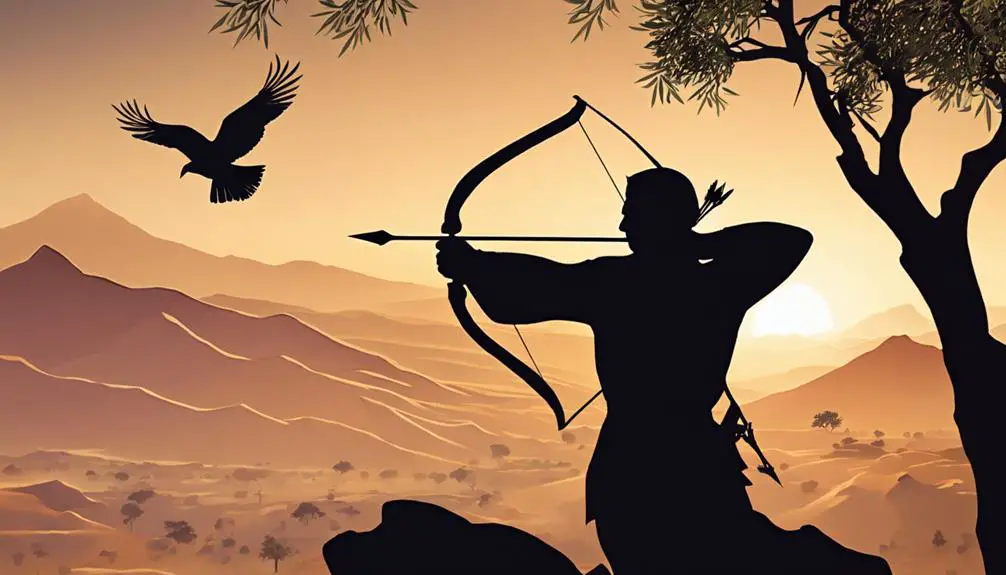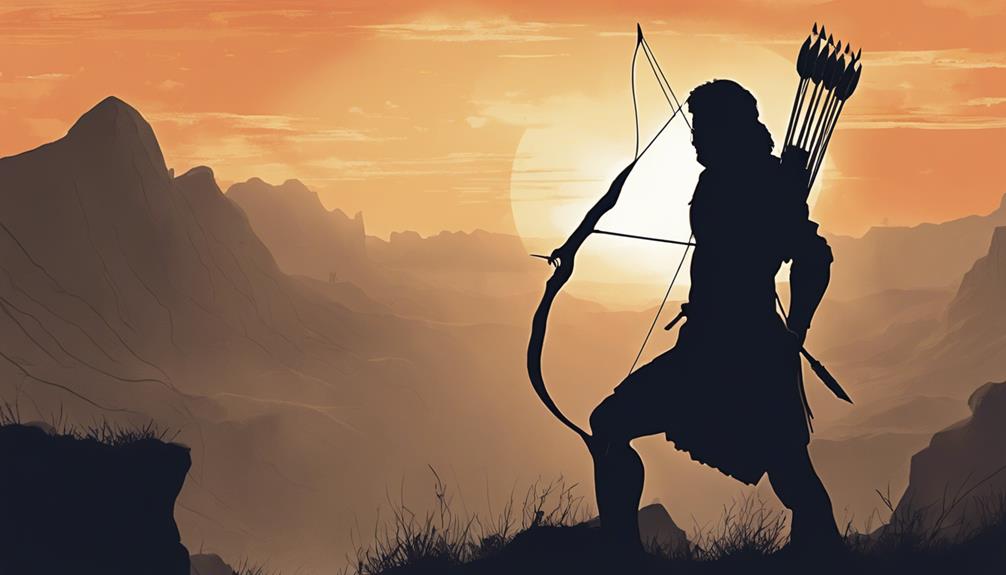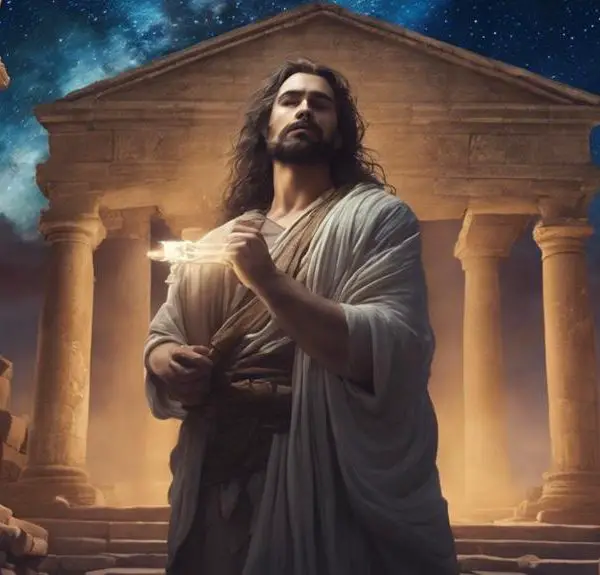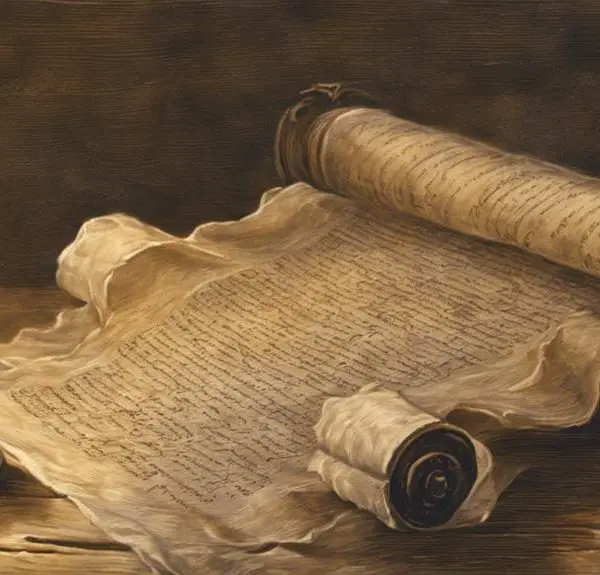Mysteries of biblical archers unfold, revealing judgment, survival, and divine secrets – uncover their profound significance in ancient texts.

Archer in the Bible
You might think that archery doesn't hold much significance in the biblical narrative, yet the skill of the archer weaves through the text, revealing layers of meaning and insight.
From Ishmael's blessing in the wilderness to the strategic use of archers in warfare, and even as a symbol in prophetic imagery, archery serves as a powerful motif.
It's not just about the physical act of drawing a bow; it uncovers themes of judgment, survival, and divine intervention.
Let's explore how these ancient narratives shed light on the broader spiritual and historical context, inviting you to uncover the depth of archery's significance in the Bible.
Key Takeaways
- Archery in the Bible symbolizes God's provision, protection, and blessings, particularly through Ishmael's story.
- Biblical archers in warfare reflect strategic importance, showcasing mobility, precision, and psychological impact.
- The symbolism of archery in scripture relates to moral discernment, spiritual readiness, and divine protection.
- Archery's role in prophetic imagery and judgment in the Bible emphasizes precision, divine intervention, and the alignment of human actions with divine will.
Ishmael's Archery Blessing

In the biblical narrative, Ishmael's proficiency in archery signifies a divine blessing, highlighting his survival and autonomy in the wilderness (Genesis 21:20). This skill isn't merely a means of sustenance but a symbol of God's sustaining grace amidst desolation. Analyzing this, you'd find that Ishmael's lineage, as Abraham's son, places him in a narrative where divine intervention and blessing are recurrent themes. His mastery in archery, therefore, serves as a testament to his chosen status, ensuring his descendants, the Ishmaelites, inherit a legacy of resilience and survival in desert conditions.
Moreover, Ishmael's archery is emblematic of desert survival skills that are essential for navigating the harsh, unforgiving environment. This not only underscores his capability to thrive independently but also foreshadows the nomadic lifestyle and warrior traits that would characterize his progeny. The mention of his archery prowess in the context of divine blessing also suggests a broader theological motif: God's provision and protection for those seemingly cast aside. By analyzing Ishmael's story through this lens, you grasp a deeper understanding of how survival skills like archery are valorized within sacred texts, serving both literal and metaphorical purposes in illustrating divine favor and human resilience.
Archers in Warfare
Throughout biblical history, archers have played a pivotal role in warfare, their skills pivotal in determining the outcomes of numerous battles. The efficiency and effectiveness of archers were highly dependent on two main factors: bow construction and historical tactics. These archers weren't just secondary forces; they were often at the forefront, shaping the course of conflict with their precision and strategic positioning.
- Bow Construction: Ancient texts and archaeological findings suggest that bow construction varied, with materials ranging from wood to horn, significantly affecting range and power.
- Mobility in Warfare: Archers were highly mobile, able to strike and move quickly, disrupting enemy lines without direct confrontation.
- Siege Warfare: In sieges, archers played a critical role in both defense and offense, launching arrows over fortifications or shooting down from walls.
- Psychological Warfare: The mere presence of archers could intimidate opposing forces, with volleys of arrows serving as both a physical and psychological weapon.
In analyzing these elements, it's clear that the strategic use of archers in biblical times wasn't just a matter of having superior numbers or equipment, but understanding and leveraging the dynamics of bow construction and historical tactics to achieve victory.
Symbolism of Archery

Beyond its practical applications in warfare, archery in the Bible symbolizes various spiritual and moral themes, reflecting deeper layers of meaning within the texts. You'll find that archery skills aren't just historical or martial artifacts; they're imbued with rich cultural representations and insights into the human and divine nature.
Theme |
Interpretation |
|---|---|
Precision |
Archery's emphasis on accuracy mirrors the biblical call for moral precision and discernment in life's choices. |
Preparation |
The preparation of an archer, including the crafting of the bow and arrows, symbolizes the spiritual readiness and the cultivation of virtues required for righteous living. |
Protection |
In narratives, the bow often serves as a tool for divine protection, suggesting the protective nature of God's interventions in human affairs. |
This symbolism extends beyond mere martial prowess; it invites you to examine the virtues of patience, focus, and dedication. Such themes are not arbitrary but are woven into the fabric of biblical narratives, offering layers of meaning that transcend the immediate context of archery. Through these representations, the Bible uses the archer's craft as a lens through which to explore and communicate profound spiritual truths and ethical imperatives.
Prophetic Imagery
Exploring the symbolic dimensions of archery leads us to the rich prophetic imagery found within the Bible, where archers often embody messages of divine forewarning and promise. These narratives aren't just historical recountings; they're layered with meaning, intended to draw you into a deeper understanding of spiritual truths. The imagery of divine arrows and celestial bowmen serves to convey messages that are both urgent and eternal, weaving a tapestry of divine communication that spans the ages.
- Divine Arrows as Instruments of Divine Will: Often, divine arrows symbolize the precise and targeted nature of God's will, unfailingly hitting the mark.
- Celestial Bowmen as Messengers: These celestial figures represent the direct intervention of the divine in human affairs, serving as both protectors and heralds.
- Archery as a Metaphor for Prophecy: The act of releasing an arrow parallels the delivery of a prophetic message, signifying the inevitability of its fulfillment.
- The Bow, a Symbol of Divine Power and Judgment: In prophetic literature, the bow signifies God's unmatched power, ready to be unleashed.
Analyzing these elements reveals the profound depth of archery's symbolic role in biblical prophecy, emphasizing the meticulous care with which divine messages are delivered to humanity.
Archery and Judgment

In biblical narratives, archery frequently stands as a potent symbol of divine judgment, showcasing how God's decisions are executed with precision and intention. This imagery isn't merely for dramatic effect; it deeply intertwines with cultural perceptions of archery, often viewed as an art that requires not just physical strength, but also mental discipline and moral clarity.
Consider how archery competitions, with their rigorous standards for accuracy and fairness, might reflect the biblical portrayal of God's judgments. These contests aren't just about hitting a target but doing so with integrity, underpinning the concept that divine judgment isn't arbitrary but based on a clear set of principles. Such parallels between archery and divine judgment illuminate the narrative's intention to convey God's actions as deliberate and just, rather than capricious.
Moreover, the archer's role in these stories often goes beyond mere symbolism. It serves to remind the audience of the necessity of aligning with moral and divine laws, mirroring how archers align their posture, aim, and release to hit the mark. This alignment between human actions and divine will, underscored by the motif of archery, encapsulates the biblical perspective on judgment, where precision, intention, and righteousness converge.
Frequently Asked Questions
How Did the Skill of Archery Influence the Daily Lives and Survival Strategies of Biblical Communities Outside of Warfare?
Archery wasn't just for war; it deeply influenced daily life. You'd see its impact in hunting practices essential for food and clothing.
It wasn't all about survival, though. Archery competitions fostered community bonds and honed skills. These events were critical in maintaining a high level of proficiency outside of warfare, ensuring that communities weren't just surviving but thriving, through both the tangible benefits of hunting and the social cohesion from competitive events.
Were There Any Specific Rituals or Ceremonies Involving Archery That Are Not Directly Related to Warfare or Prophetic Symbolism?
You're likely curious about archery's role beyond warfare, especially in rituals or ceremonies.
While specific references are scarce, it's plausible that archery competitions could've served both as community bonding and skill sharpening exercises.
Moreover, considering the era's deep intertwining of daily life with religious symbolism, it wouldn't be far-fetched to imagine archery being incorporated into non-warfare ceremonial contexts, reflecting themes of providence, accuracy, and perhaps even divine protection.
Can We Identify Any Notable Female Archers in the Bible, and What Roles Did They Play in Their Narratives?
You might wonder if there were notable female archers in historical narratives, especially given gender roles and cultural symbolism. In truth, the Bible doesn't highlight female archers in its texts.
This absence speaks volumes about the cultural and symbolic roles attributed to genders during biblical times. Analyzing this, scholars suggest it reflects societal norms and the symbolic representation of archery, rather than a commentary on women's capabilities or contributions.
How Did Ancient Biblical Societies Manufacture and Maintain Their Archery Equipment, and Were There Any Significant Innovations in Archery Technology Mentioned in the Bible?
You're curious about ancient archery technology, specifically regarding bow materials and quiver designs.
The Bible doesn't provide detailed descriptions of these aspects. However, it's understood that wood, horn, and sinew were likely materials for bows, reflecting common ancient practices.
Quiver designs likely varied, but specifics aren't mentioned. Without direct references, it's challenging to pinpoint innovations in biblical times, suggesting a reliance on broader historical and archaeological evidence for insights.
Aside From Ishmael and Other Figures Commonly Associated With Archery, Are There Lesser-Known Individuals in the Bible Who Were Also Skilled Archers, and What Stories Are Associated With Them?
Ever wondered about the precision of ancient skills? You're not alone.
While diving into historical texts, you'll find that archery wasn't just for the well-known. Lesser-known figures also mastered it, their stories woven with archery metaphors and tales of rigorous archery training.
Analyzing these accounts provides a scholarly glimpse into the past, revealing that archery was more than a skill; it was a profound element of their narratives and survival strategies.
Conclusion
In conclusion, the bow in the Bible isn't merely a weapon; it's a profound symbol interwoven with the fabric of biblical narratives, embodying blessing, judgment, and prophecy.
Take, for instance, Ishmael's blessing (Genesis 21:20), which isn't just about survival but signifies the birth of nations under God's watchful eye.
Through this lens, archery in the scriptures offers a rich tapestry of meanings, illustrating how God's intentions and human history are intricately connected, pointing beyond the physical to the spiritual battles and victories that define our existence.



Sign up